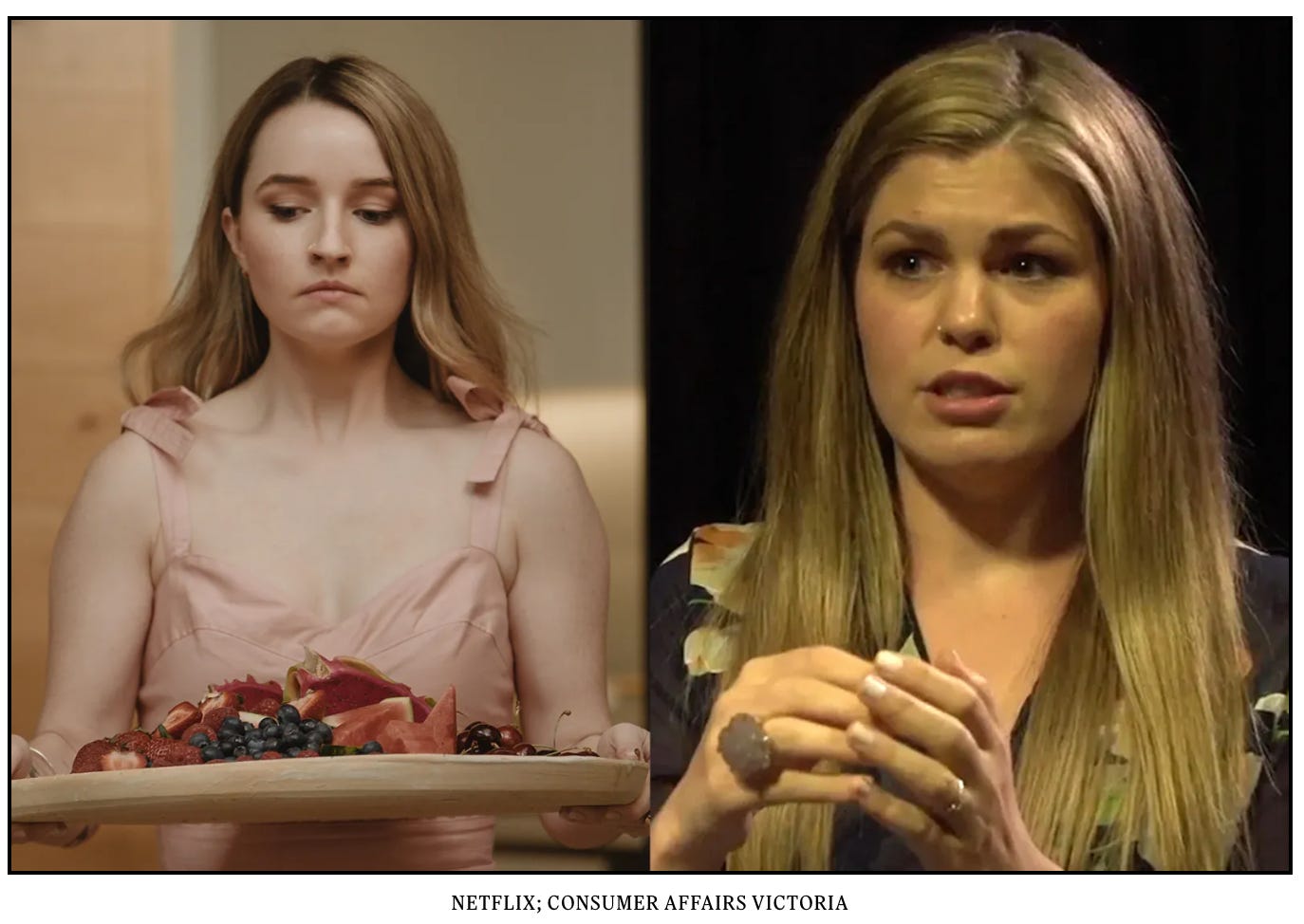Not all that glitters is gold
Wellness grifters tend to follow a common theme... and the end result is not health promoting.
I watched Apple Cider Vinegar (ACV) on Netflix, so you don’t have to. Well, you can, and maybe you should because it was entertaining. But I couldn’t help feeling a little bit sad since this was a true story and summarizes the wellness industry in a nutshell. A little bit of healthism mixed in with a little bit of orthorexia. And for those who want financial gain, a dash of disinformation to finish the recipe off.
Apple Cider Vinegar summarized
I’ll also say that because this is a true story, this newsletter won’t count as a spoiler to the series. You can Google everything…
For context, ACV is based on the true story of Australian wellness influencer Belle Gibson. Gibson amassed a large social media following with her holistic wellness approach to cancer. Her story was that she was given 4 months to live maximum by doctors for brain cancer. Instead of taking the traditional medicinal route, she claimed to cure herself with certain eating habits (organic foods and juices) and other holistic approaches. Her social media presence was large, she created an app called The Whole Pantry and was given a book deal with the same name that sold 16,000 copies in its first year. Here’s the catch - the cancer diagnosis was fake, made up, and completely fabricated.
Unfortunately, her 200,000+ followers on social media didn’t realize this until there was some digging and investigating by journalists from The Age. Unfortunately, even though it was becoming clear that the cancer diagnosis was not real, there wasn’t proof, and publishing a story on someone’s medical history without proof is defamatory. Instead, the journalists decided to go after Gibson’s charity fraud when families from various fundraising events reported never receiving a dime.
In 2017, the Federal Court of Australia found Belle Gibson guilty of misleading and deceptive conduct in civil court proceedings, and she was fined A$410,000 (£205,000). However, such little finances were left from The Whole Pantry that by late 2023, the entire fine amount was still outstanding. Gibson has also since deleted all social media.

I imagine you’re thinking, “Wow!” reading this; if you weren’t familiar with the story and how this is almost so egregious, it seems like just a Hollywood tale. But unfortunately, it’s not. I remember hearing about Gibson during her trial and then watching ACV; my first thought was there are definitely some psychological factors at play here because most people would never make up something like a cancer diagnosis in the first place. My second thought was, oh my goodness, the amount of people who really did have cancer who were following Gibson and decided to take her advice. And this is when wellness can get deadly.
When information is really misinformation and disinformation
Here’s the thing - I can understand getting a diagnosis like cancer and trying to think of as many different solutions and treatments as possible. I also understand wanting to dabble in holistic approaches when you are trying to find a solution to a problem, but the wellness industry has a misinformation and disinformation problem.
You have probably heard of the term misinformation, but disinformation is a strong contender for some of the content that is out there. Misinformation is false or inaccurate information, getting the facts wrong. Disinformation is false information that is deliberately intended to mislead, intentionally misstating the facts. The Belle Gibson story above is 100% disinformation. Faking cancer and then selling solutions based on false pretenses is not only horrific but, unfortunately, not a one-off situation within the wellness industry.
I’ll never forget when YouTuber Yovana Mendoza Ayres, who built her platform off of being a raw vegan, was “outed” for not being authentically vegan. A video started
If you do not wish to commit to a subscription, this is a reminder that I have a book out now titled “Live Nourished,” and it is available wherever books are sold and on audio.
Keep reading with a 7-day free trial
Subscribe to The Nutrition Tea Substack to keep reading this post and get 7 days of free access to the full post archives.





